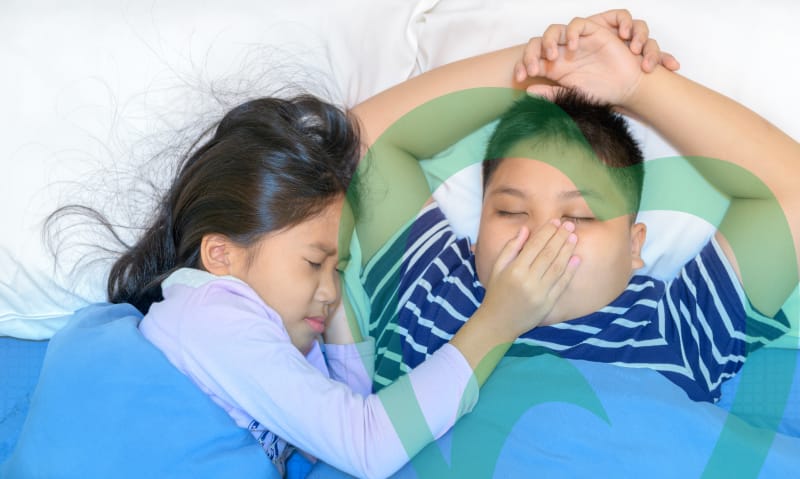Can Kids Have Sleep Apnea? The Answer Is YES!

You’ve likely heard of sleep apnea before but might associate it with growing older. While many of the common risk factors for sleep apnea correlate with age, the condition can actually affect patients of any age. In fact, pediatric sleep apnea can affect children, impacting their health, wellness, and education.
What is sleep apnea?
Many people first come across the term “sleep apnea” when trying to find out how to stop snoring. That’s one of the primary symptoms of the condition, along with sudden waking throughout the night and fatigue during the day.
Sleep apnea occurs when breathing stops during sleep. When breathing stops, you’ll jolt awake suddenly, gasping for air. Many people fall asleep immediately afterward and have no memory of the event. This can make it difficult for people to realize that the tiredness and other symptoms they feel are caused by sleep apnea.
Left untreated, sleep apnea can lead to serious health issues. High blood pressure to compensate for low blood oxygen levels can lead to various cardiovascular conditions.
In addition, sleep apnea often causes people to breathe with their mouths open, which results in dry mouth. Saliva normally helps fight bacteria and tooth decay, but low levels increase your risk.
Understanding Pediatric Sleep Apnea
There are two primary types of sleep apnea: obstructive sleep apnea (OSA) and central sleep apnea. The first is more common and involves throat muscles relaxing and closing the airway. The second is a condition where that affects the nerves responsible for controlling breathing.
Obstructive sleep apnea can affect children, with as many as 1 to 4% of children experiencing the condition. This is lower than in adults, where sleep apnea affects 2 to 5% of women and 3 to 7% of men. However, it is still prevalent enough that it may be a concern for your child.
A variety of risk factors can contribute to pediatric sleep apnea. Your child may have a smaller than typical airway, making it easier to obstruct. Large tonsils or adenoids can cause this, along with a variety of rarer craniofacial disorders. A lack of muscle development at the back of the throat can also lead to the airway closing.
Obesity can increase the risk of pediatric sleep apnea, just as it does for the condition in adults. One of the most prominent risk factors for pediatric sleep apnea is also Down syndrome. Between 53 and 76% of children with Down syndrome have sleep apnea.
Recognizing Sleep Apnea Symptoms in Children
You may be unsure how to recognize whether sleep apnea is affecting your child. Watch for signs such as:
- Loud snoring
- Restless sleep
- Gasping during sleep
- Daytime sleepiness
- Irritability
- Difficulty concentrating
It can be easy to overlook these symptoms, as they can have a variety of potential causes. However, if you or a caregiver notice multiple symptoms in your child, it’s important to reach out to your dentist to discuss the possibility of pediatric sleep apnea.
Untreated Sleep Apnea and Cognitive Development
Left untreated, sleep apnea may impact your child’s cognitive function and learning abilities. While the exact details aren’t yet known, sleep apnea seems to delay cognitive development in many children, whether due to low-quality sleep, oxygen deprivation, or other factors. Acting now is key for your child’s development.
Effects of Pediatric Sleep Apnea on Behavior and School Performance
Along with health issues, sleep apnea can also affect behavior and performance at school. Lack of sleep leaves your child tired and irritable, which can lead to difficulty concentrating, poor performance, mood swings, or even hyperactivity. You may start to see your child’s grades falling or your child getting in trouble more often.
These issues are often attributed to other causes, while sleep apnea may be a primary contributor. School behavior and performance are complicated areas that involve many factors. Make sure to take note of any other potential symptoms if your child is struggling at school, as sleep apnea may play a part in their difficulties.
Sleep Apnea Diagnosis and Treatment Options
If you believe your child may have sleep apnea or other issues, you can talk to your dentist about it. If it seems like sleep apnea is a possibility, they can refer you to an appropriate sleep specialist for a formal diagnosis. This can involve tests, such as polysomnography, a sleep study where your child is observed overnight.
If sleep apnea is present, it is important to find effective treatment. Treating sleep apnea is not just about finding how to stop snoring; it’s also about your child’s health and development.
Serious cases may call for continuous positive airway pressure (CPAP) or myofunctional therapy. However, simple options, such as nightguards, can often relieve symptoms in mild-to-moderate cases.
Your Experienced Dentist in Omaha for Sleep Apnea
If you’ve noticed any signs of sleep apnea in your child, you can visit The Tooth Doc to find the source of the problem and resolve it with effective treatment options. A custom nightguard could be the right choice to help your child sleep soundly again. Schedule a consultation to take action on pediatric sleep apnea today.